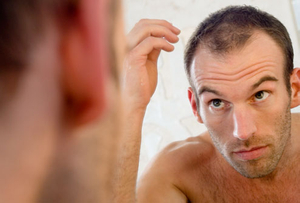What You Need to Know About DHT Theory?

When it comes to hair loss, there are a number of theories about why it occurs and how best to fight it. One of the prevailing theories is DHT theory and how it affects hair growth and loss.
DHT Theory and Hair Loss
Dihydrotestosterone (DHT) is a hormone that helps with the health of the hair follicles. Men that have permanent hair loss, or alopecia, typically have lower levels of certain hormones, including sex-hormone binding globulin (SHGB), follicle stimulating hormone (FSH), testosterone, and epitestosterone.
Some studies have shown that DHT affects the activity of insulin-like growth factor (IGF), which stimulates dormant hair follicles, correcting hair loss and encouraging hair growth. As an androgenic hormone, it primarily affects sexual development at birth, at puberty, and into adulthood. They help to manage sebaceous glands, hair growth around sweat glands, and libido. It will affect facial hair growth as well. However, as you age, these androgens can affect the growth of hair on the head, affecting hair loss.
There are a few things you’ll want to know about DHT theory and how it can affect both hair loss and growth.
The Basic Argument
There are three main things that support the DHT theory of hair loss. Men that have thinning hair have higher levels of DHT in their scalps, men that have extremely low DHT levels never experience baldness, and men that lack the enzyme which converts testosterone into DHT in the scalp do not experience hair loss.
All of these arguments support the claim that DHT does in fact affect hair growth and can even lead to hair loss in many cases. It seems that the presence of DHT does impact hair loss and will lead to that while the absence of DHT means that your hair will grow healthy and be unaffected.
Age
DHT related hair loss happens more as you get older. Androgen, which stimulates facial hair growth, also suppresses scalp hair. This strange effect is often called the androgen paradox. As you age, your hormones change and fluctuate. Aging causes your DHT and 5-alpha reductase levels to decrease, which can affect your hair growth and even lead to hair loss.
Why DHT Theory May Not Explain Hair Loss
Although there are many things that suggest that DHT does impact hair loss on your head, it has the opposite effects on body and facial hair. The fact that it helps growth in body hair but reduced hair growth on the scalp is something that is still not fully understood.
While DHT theory may in fact explain much about hair loss, it is important to remember that multiple factors work together to create the results you are looking for. When understanding hair loss, you will always want to consider that there are a number of things that are contributing to it, not just one isolated factor. DHT theory, it seems, is a key component of understanding hair loss.

